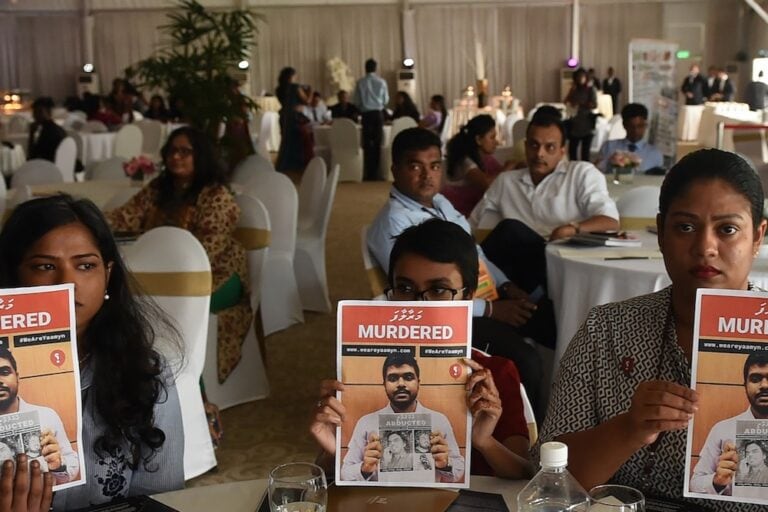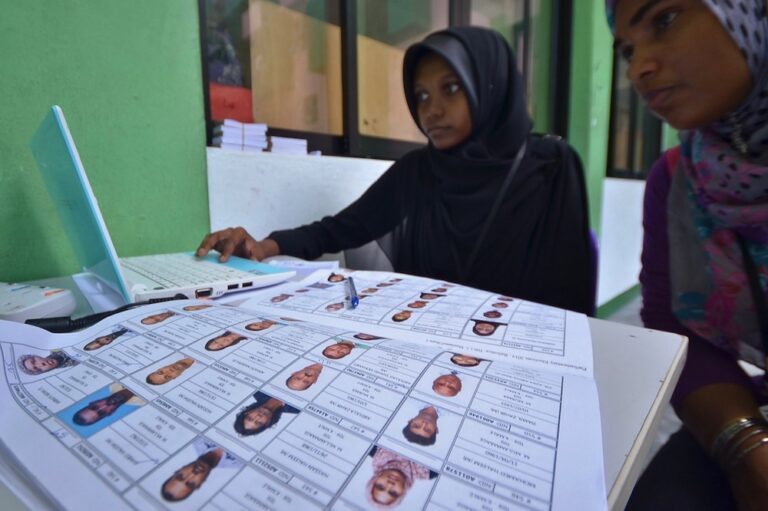(RSF/IFEX) – Reporters Without Borders has voiced concern about the attitude of the Maldivian authorities, who recently expelled two foreign journalists ( including one working for the online newspaper http://www.Minivannews.com ), arrested an opposition cartoonist, and backtracked on plans to end the state’s broadcast media monopoly. “The government should be trying to defuse tension on […]
(RSF/IFEX) – Reporters Without Borders has voiced concern about the attitude of the Maldivian authorities, who recently expelled two foreign journalists ( including one working for the online newspaper http://www.Minivannews.com ), arrested an opposition cartoonist, and backtracked on plans to end the state’s broadcast media monopoly.
“The government should be trying to defuse tension on the eve of a major opposition demonstration, but instead the police are intimidating, expelling or arresting journalists perceived as being sympathetic to the protest,” the press freedom organisation said.
“We once again point out that an opposition media has as much right to work freely as a pro-government media,” Reporters Without Borders added. “The harassment of ‘Minivan’ and Minivannews.com journalists must stop.”
The government accused “Minivan” of calling for the assassination of President Abdul Gayoom when the opposition Maldivian Democratic Party (MDP) launched its campaign for the 10 November 2006 demonstration at the start of October. Thereafter, the authorities have been accusing the opposition of trying to foment an insurrection.
The MDP portrays the 10 November demonstration as a national rally aimed at speeding up democratic reforms. Around 30 of its activists have already been arrested.
Reporters Without Borders takes note of the fact that Maldivian and foreign journalists were able to freely cover the 6 November demonstration outside MDP headquarters. The organisation reiterates its appeal to the authorities to let the press work freely, as officials undertook to do when they met with a visiting International Mission for Press Freedom in May.
Phillip Wellman, an American reporter working in the Maldives for the online newspaper Minivannews.com, was arrested together with Graham Quick, a freelance photographer working for the London-based “Observer” newspaper, on 3 November on the southern atoll of Gaaf Dhall, where they had gone to cover the arrests of MDP activists.
They were held for several hours and questioned about the people they had met. The police officer interrogating them tried to erase their recordings and photos. The next day, after leaving the atoll, they were told by officials at Male airport that they had to leave the country and were put on flights to Colombo and London. Wellman had been in the Maldives since 10 October.
Reached by telephone, government spokesman Mohamed Hussain Shareef told Reporters Without Borders the arrest and expulsion of the two journalists were justified because of their “activism.” He added: “They will be welcome in the Maldives in two weeks’ time.” Minivannews.com and the “Observer” confirmed to Reporters Without Borders that the two journalists were working for them.
Cartoonist and opposition activist Ahmed Abbas was arrested in Male on 3 November after leaving the United Nations offices where he had requested asylum. He is now being held in Maafushi prison, where he is being made to serve a six-month prison sentence that was imposed when he was convicted in absentia of “disobedience.”
His offence was to have told “Minivan” in August 2005: “What we should do to those in the Star Force [an elite police unit] who beat us, is to seek them out individually and for us to act in such a manner that makes them feel that beatings result in pain, otherwise they will not be subdued.” “Minivan” editor Amintah Najeeba and sub editor Nazim Sattar have also been charged with “disobedience to order.”
Abbas, who is well-known for his sarcastic cartoons for “Minivan” and opposition websites, said he never received a summons to attend his trial, of which the verdict was published by the pro-government website http://www.Factmaldives.com on 1 November.
Meanwhile, the information ministry did not keep its promise to end the state’s monopoly of radio and TV broadcasting on 31 October. It was announced on 1 November that the opening up of broadcasting to the private sector will be strictly controlled by the law, but that in the absence of legislation, this has been delayed. A draft law was sent to the parliament (the People’s Majlis) but has not yet been adopted.
A government statement said the broadcast media will be monitored because of the negative effects of unconditional press freedom. In view of these developments, Reporters Without Borders fears that Minivan Radio will be refused a licence. Currently based outside the country, it is the only non-governmental radio station broadcasting in Dhivehi, the national language.


